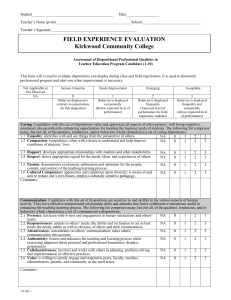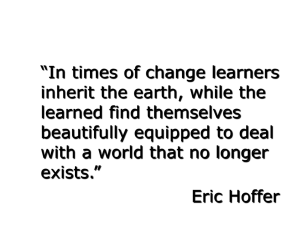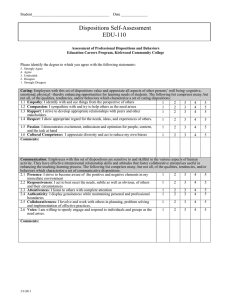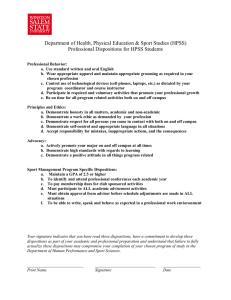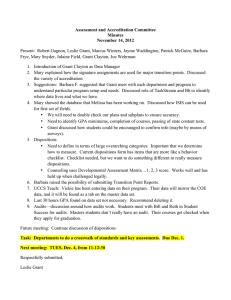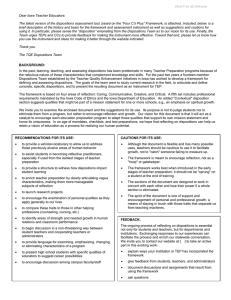THE IOWA DISPOSITIONS MODEL A FRAMEWORK FOR DEVELOPING EFFECTIVE TEACHER DISPOSITIONS
advertisement
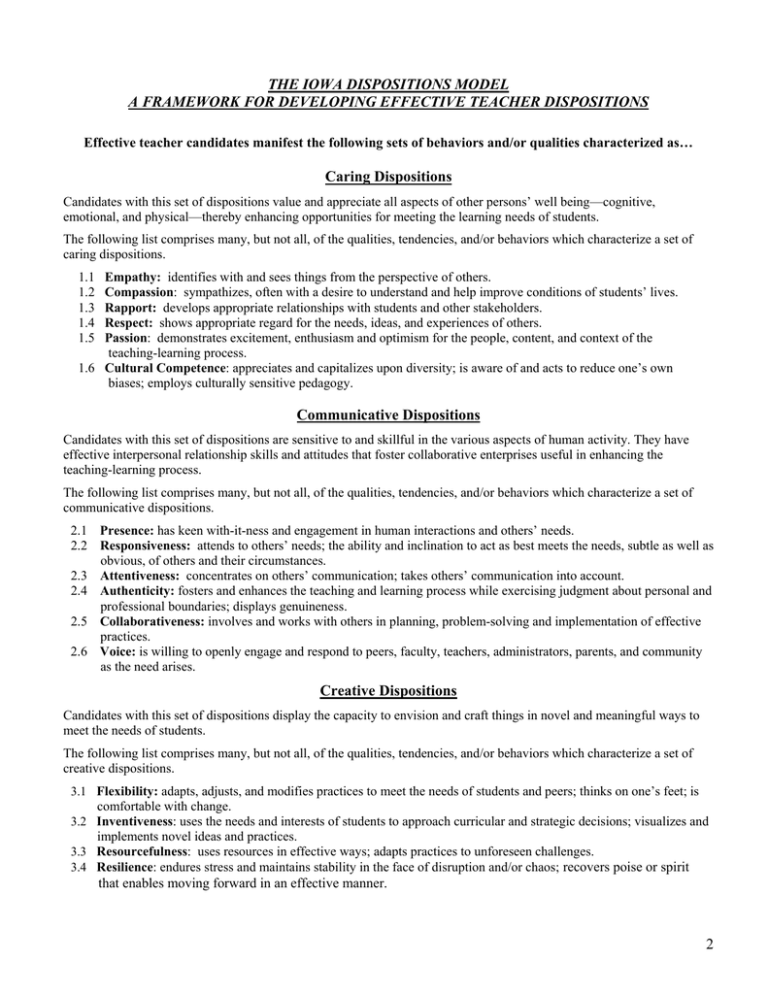
THE IOWA DISPOSITIONS MODEL A FRAMEWORK FOR DEVELOPING EFFECTIVE TEACHER DISPOSITIONS Effective teacher candidates manifest the following sets of behaviors and/or qualities characterized as… Caring Dispositions Candidates with this set of dispositions value and appreciate all aspects of other persons’ well being—cognitive, emotional, and physical—thereby enhancing opportunities for meeting the learning needs of students. The following list comprises many, but not all, of the qualities, tendencies, and/or behaviors which characterize a set of caring dispositions. 1.1 1.2 1.3 1.4 1.5 Empathy: identifies with and sees things from the perspective of others. Compassion: sympathizes, often with a desire to understand and help improve conditions of students’ lives. Rapport: develops appropriate relationships with students and other stakeholders. Respect: shows appropriate regard for the needs, ideas, and experiences of others. Passion: demonstrates excitement, enthusiasm and optimism for the people, content, and context of the teaching-learning process. 1.6 Cultural Competence: appreciates and capitalizes upon diversity; is aware of and acts to reduce one’s own biases; employs culturally sensitive pedagogy. Communicative Dispositions Candidates with this set of dispositions are sensitive to and skillful in the various aspects of human activity. They have effective interpersonal relationship skills and attitudes that foster collaborative enterprises useful in enhancing the teaching-learning process. The following list comprises many, but not all, of the qualities, tendencies, and/or behaviors which characterize a set of communicative dispositions. 2.1 Presence: has keen with-it-ness and engagement in human interactions and others’ needs. 2.2 Responsiveness: attends to others’ needs; the ability and inclination to act as best meets the needs, subtle as well as obvious, of others and their circumstances. 2.3 Attentiveness: concentrates on others’ communication; takes others’ communication into account. 2.4 Authenticity: fosters and enhances the teaching and learning process while exercising judgment about personal and professional boundaries; displays genuineness. 2.5 Collaborativeness: involves and works with others in planning, problem-solving and implementation of effective practices. 2.6 Voice: is willing to openly engage and respond to peers, faculty, teachers, administrators, parents, and community as the need arises. Creative Dispositions Candidates with this set of dispositions display the capacity to envision and craft things in novel and meaningful ways to meet the needs of students. The following list comprises many, but not all, of the qualities, tendencies, and/or behaviors which characterize a set of creative dispositions. 3.1 Flexibility: adapts, adjusts, and modifies practices to meet the needs of students and peers; thinks on one’s feet; is comfortable with change. 3.2 Inventiveness: uses the needs and interests of students to approach curricular and strategic decisions; visualizes and implements novel ideas and practices. 3.3 Resourcefulness: uses resources in effective ways; adapts practices to unforeseen challenges. 3.4 Resilience: endures stress and maintains stability in the face of disruption and/or chaos; recovers poise or spirit that enables moving forward in an effective manner. 2 Critical Dispositions Candidates with this set of dispositions have the ability to examine closely, to critique, and to ask questions. They do not accept the status quo at face value but employ higher level thinking skills to evaluate, analyze, and synthesize. Selfevaluation and reflection characterize candidates with this set of dispositions. The following list comprises many, but not all, of the qualities, tendencies, and/or behaviors which characterize a set of critical dispositions. 4.1 Reflectiveness: takes time consistently to evaluate effectiveness of instruction and behavior in terms of the larger goals of education; nurtures reflectivity in students and peers; reflects on own growth and accountability. 4.2 Initiative: exhibits a willingness to pursue solutions to problems or questions; gathers relevant data and persistently seeks to improve situations or areas of need. 4.3 Open-mindedness: exhibits an ability to look at different sides of an issue; recognizes the possibility of error in one’s own beliefs and practices; does not display or act upon prejudices against people or ideas. 4.4 Efficacy: nurtures high expectations, demonstrates self direction and confidence, and empowers students and peers. 4.5 Humility: places the needs of the learner and/or learning task above one's own ego; reflects on own growth and accountability. Contextual Dispositions This category includes any additional dispositions defined by and consistent with the school’s mission and/or conceptual framework. For example: 5.1 Spiritual Maturity: responds to challenging situations in a Christ-like manner. 5.2 Change Agent: seeks actively to improve situations for students and colleagues when possible; will speak up for what is best, not just what is. Professional Requirements These are qualities and practices that teacher candidates must exhibit in order to be recommended for licensure, some of which are explicit in the Iowa Code of Ethics and Code of Professional Responsibilities. The candidates will display all of the following qualities and/or behaviors that characterize this set of professional requirements. 6.1 Professionalism: endeavors to meet the standards expected of a teacher such as appropriateness of dress, grooming, demeanor, punctuality, work ethic, tact, discretion, courtesy, etc. 6.2 Personal and Professional Ethics and Integrity: adheres strongly to high moral principles and ethical standards as expressed in the Iowa Code of Ethics and Code of Responsibilities; evidences integrity. 6.3 Work Ethic/Responsibility: attends to school policy for teacher attendance; completes teaching related tasks in a thorough and efficient manner. 6.4 Confidentiality: complies with federal, state, and school policies relating to confidentiality. 3
